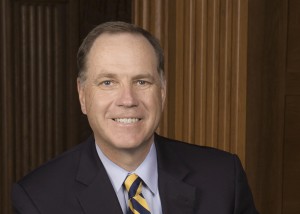Allegheny College President Emeritus James H. Mullen, Jr. Named Fall 2019 President-in-Residence at Harvard Graduate School of Education

In addition to continued involvement with the Allegheny College Prize for Civility in Public Life and other strategic efforts, Allegheny President Emeritus James H. Mullen, Jr. has been selected to serve as the fall 2019 president-in-residence in the Higher Education Program at the Harvard Graduate School of Education.
Mullen transitioned to the role of president emeritus on June 30 after 11 years of service as Allegheny’s 21st president. The college’s Board of Trustees conferred the status on Mullen in May in honor of his distinguished service.
“We’re looking forward to having Jim Mullen join us at HGSE and know that his leadership of private and public colleges and universities and across an array of administrative roles will make him an excellent resource for our students,” said Judith Block McLaughlin, senior lecturer at the Harvard Graduate School of Education.
The President-in-Residence Program was established in 2001 by the Higher Education Program at the Harvard Graduate School of Education. Every year, the program brings a distinguished former college or university president to attend classes alongside students and to anchor academic discussions with real-world experience. Outside of class, the president-in-residence meets with students one-on-one as well as in group sessions, including meals, and advises students on important academic and career decisions.
“I am very excited to return to Harvard to serve as president-in-residence in the Graduate School of Education,” said Mullen, who earned a master’s degree in public policy from the John F. Kennedy School of Government at Harvard. “It is an honor to have this special opportunity to mentor students who are pursuing leadership positions in higher education and working to make a positive difference in the lives of students.”
Mullen has two decades of experience as a college president. Prior to holding Allegheny’s highest office, he led Elms College from 2005 to 2008 and the University of North Carolina at Asheville from 1999 to 2005. In addition, Mullen has held administrative leadership positions at a wide range of public and private institutions, serving as an executive vice president, vice president for fiscal and development affairs, vice president for strategic planning and community relations, and vice president for student services.
During Mullen’s tenure, Allegheny celebrated its bicentennial in 2015, and he also led the largest comprehensive fundraising campaign in the college’s history, raising over $180 million. In addition, one of Mullen’s key initiatives was the establishment of the national Allegheny College Prize for Civility in Public Life, which was created in 2011 to annually recognize public figures who argue passionately but respectfully for their beliefs. In 2017, the Allegheny College Prize for Civility in Public Life in Pennsylvania was awarded at the state level for the first time. A companion prize for Allegheny students also was established in 2017 and was renamed the Dr. James H. Mullen, Jr. Student Prize for Civility in Public Life in 2019.
In addition, Mullen has served as chair of the board of directors of the American Council on Education (ACE), the major coordinating body for the nation’s colleges and universities, with a base of more than 1,800 member institutions. He also served ACE as a representative of the National Association of Independent Colleges and Universities (NAICU), which represents more than 1,000 private nonprofit institutions of higher learning on higher education policy issues with federal and state governments. In addition, Mullen chaired the board of directors of the Great Lakes College Association and served as vice president of the North Coast Athletic Conference. Along with his leadership roles in higher education and civic organizations, Mullen has been a sought-after lecturer in public policy and civility in public discourse, where his work focuses on the American presidency as well as history and political science.